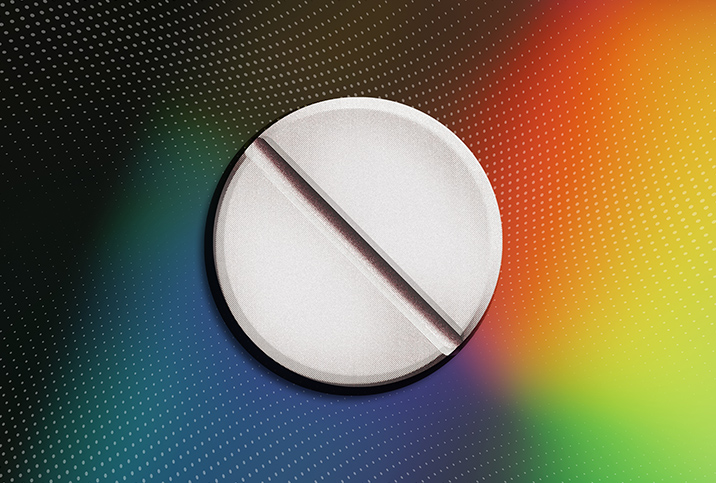Over-the-Counter Drugs Are Safe, Right?

Every so often, when I get a raging headache, I wrestle open a bottle of ibuprofen and pop a pill or two with the hope that my pain will subside. It almost always works.
A common side effect of prescription medications that treat depression, high cholesterol and hypertension is known to be erectile dysfunction (ED). However, according to a Harvard Special Health Report published in 2021, an estimated 25 percent of ED is a side effect of taking over-the-counter and prescription medications.
For many people, very little thought goes into taking over-the-counter (OTC) drugs or how they might affect their sexual health. The U.S. Food and Drug Administration (FDA) approves every drug for sale to the public in pharmacies and grocery stores. Plus, in all the ads on TV, doctors say they're good for us and will cure our ills. What could go wrong?
It's all there in black and white
The National Institute on Drug Abuse defines OTC medicines as ones that can be sold directly to consumers without a prescription from a doctor. Over-the-counter medicines treat a variety of illnesses and symptoms, such as general pain, coughs and colds, diarrhea, constipation, acne and other common ailments. Like all drugs, OTC medicines can trigger side effects, which customers should research and understand prior to consumption.
Typically, instructions are printed on the packaging, but similar to legal notices and user agreements we click "agree to" when we add software to our laptop or phone, we may not be likely to read those rules and regulations as closely as we should.
According to the MSD Manual—also known as the Merck Manual, a long-established medical textbook—certain groups of people, such as the very young, the very old, the very sick, and pregnant and breastfeeding women, are more vulnerable to harm from drugs, including OTC medicines. These people should take special precautions, including professional supervision, when they use drugs.
To avoid dangerous drug-related interactions, the Merck Manual advises consulting a pharmacist or doctor before taking prescription drugs and OTC drugs at the same time, especially if you have a chronic disorder. OTC drugs are not designed to treat serious diseases and can potentially make them worse. An unanticipated reaction, such as a rash or insomnia, is a signal to stop taking an over-the-counter drug immediately and obtain additional medical advice.
OTC drugs and sexual health
Numerous articles have reported women struggling with vaginal dryness as a result of antihistamine and decongestant use. Despite these reports, sustained proof and research studies are few and far between.
Research co-written by Derelie Mangin, a family doctor and a professor at McMaster University in Hamilton, Ontario, on clinical reports of post-SSRI dysfunction found certain symptoms of sexual dysfunction—such as the onset of premature ejaculation and persistent genital arousal disorder—were unique to antidepressants. SSRIs, or selective serotonin reuptake inhibitors, are a class of drugs typically prescribed for depression.
However, many of these side effects remain unknown to the public. So what should you do if you experience effects detrimental to your sexual health?
According to Thomas Perry, M.D., a general internist and clinical pharmacologist at the University of British Columbia, it's important to note your concerns and advocate for your health.
"If a woman notes vaginal dryness or impairment of normal sexual function while taking any drug or supplement, be that a prescription, over-the-counter or 'natural' product, it is common sense to read about the product," he advised. "It also makes sense to ask the provider—prescriber, pharmacist or other—whether it may be causing the problem. Ultimately, unless the treatment is lifesaving, it could make sense to try for a few weeks to a few months without the suspected product."
Even the most harmless OTC medications can lead to a volley of side effects when used carelessly. For example, hydrocortisone—a topical application medication often used to relieve redness, itching and discomfort caused by skin conditions—can cause unwanted side effects such as blistering, flaking of the skin, burning, crusting and dryness. Along with irritation or itching, redness, soreness or swelling, it may cause thinning of the skin resulting in easy bruising. If you notice these symptoms, or rarer signs like increased hair growth, burning, pus or itching, it's important to consult a medical professional immediately.
OTC medicines such as antifungals and famotidine are used to treat stomach problems and can lead to hair loss in some people.
Outside of these relatively treatable side effects, the long-term, no-boundaries use of OTC medications without supervision can lead to issues including kidney and liver damage, heart problems, memory loss and internal stomach bleeding, and may put individuals at an increased risk for stroke and high blood pressure.
Other common side effects
Some of the more common side effects of OTC medicines include an upset stomach (including constipation or diarrhea), dry mouth, drowsiness and nausea.
According to Mahyar Etminan, Pharm.D., M.Sc., an associate professor of medicine at the University of British Columbia, the dangers of using OTC medicines without supervision are many.
"Somebody could take too much, leading to side effects and potential toxicity, [and] in some cases, leading to dangerous drug reactions that may mean hospitalizations or even death in rare instances," Etminan said.
The FDA defines a side effect as serious if the result is: death; life-threatening; hospitalization; disability or permanent damage; or exposure prior to conception or during pregnancy causing a birth defect.
Although most side effects of OTC medication are gastrointestinal, some over-the-counter antihistamines can cause heart palpitations or increase heart rate. The National Health System (NHS) in the United Kingdom describes antihistamines as a class of medication used to relieve symptoms of allergies such as hay fever, hives, conjunctivitis and reactions to insect bites or stings. But they're also used occasionally to prevent motion sickness or treat stomach problems, colds, anxiety and, in the short term, insomnia. Antihistamines also belong in the category of drugs that can cause unwanted sexual side effects, such as erectile dysfunction.
Safe practices
One of the most disconcerting aspects of OTC medications is that while they are easily accessible to the general public and marketed as quick relief, there's very little research about the application and long-term impacts of these medicines on the body.
Any patient using an OTC drug should be mindful of its dosage. Many medicines come with generalized dosage instructions. Children, older adults, pregnant people and individuals with existing health conditions need specific dosages suited to their specific needs; an adult dosage may be too strong for children. An incorrect dose may create adverse interactions with prescription drugs and possible unforeseen consequences for underlying and undetected conditions.
According to Etminan, safe practices include monitoring your symptoms and side effects when taking OTC drugs, talking to a pharmacist or physician before starting a course of any new medication, taking appropriate doses as indicated in the instructions rather than self-medicating at random, and stopping the use of the medication as soon as you experience an adverse side effect.
He emphasized that when using over-the-counter medication, it's important to do as much online research as you can. The product monograph for the drug should provide a lengthy document detailing its workings and its effects.
This might not be a task that everyone is up for, so if you have any questions, Etminan recommended speaking with your local pharmacist as they've more than likely seen it all.


















